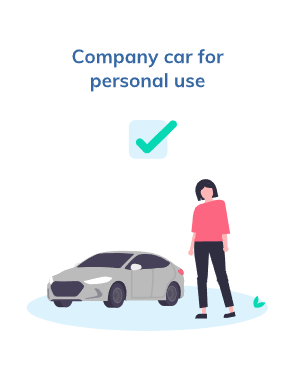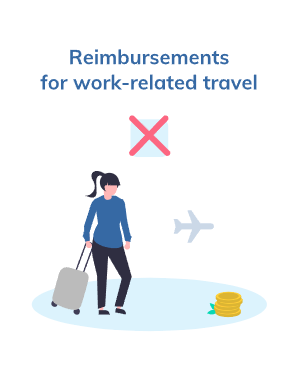

What Are Benefits in Kind?
Providing directors and employees with benefits in kind alongside their salary can be a great recruitment and staff retention tool for employers. In this article we explain what counts as a benefit in kind, and what the tax implications are.
What is a benefit in kind?
Benefits in kind, or BiKs for short, are non-cash goods and services which employers sometimes provide to employees and directors on top of their wages or salary. You might also hear them called P11D benefits, staff perks, or fringe benefits.
Some employers offer additional perks to attract and retain staff, or to make the job more comfortable or simpler. For example, a role which involves lots of travel might come with a company car so it’s easier for the employee to carry out their work.
They’re often provided for free or at a heavily subsidised rate, but because these perks are not “wholly necessary” for business purposes they’re classed as taxable benefits for employees (and employers pay National Insurance on them too).
What counts as a benefit in kind?
Companies can provide just about anything as a benefit in kind (BiK), from a company car to private healthcare or a gym membership.
What can make things confusing though, is that not all company benefits are classed as ‘benefits in kind’. For instance, childcare, food provided in the company canteen, or a company van which is only used for work, won’t be classed as a benefit in kind.
Are business expenses a benefit in kind?
Payments made to reimburse employee expenses don’t count as a benefit in kind, as long as they’re not for personal use. For example, if an employee or director goes to an off-site client meeting and the company reimburses their parking costs, this doesn’t count as a benefit in kind.
Sticking with the travel theme, giving an employee an interest free loan to buy a travel season ticket should go down as a benefit in kind. This is because it’s a payment from the business for the direct personal benefit of the employee, rather than something that the business needs to pay for because it’s essential to their work.
There are other exceptions too, such as one-off gifts, smaller benefits (known as trivial benefits), and even the work’s Christmas do!


Are benefits in kind subject to tax?
Despite not being actual cash, benefits in kind do increase the value of what an employee or director receives from a company. To keep things fair (and to reduce the risk of businesses dodging tax by paying a smaller salary topped up with benefits), staff perks are subject to income tax and National Insurance (although there are tax-free perks you can offer).
Who pays the tax on benefits in kind?
If you’re an employer, you’ll need to make Employer’s National Insurance Contributions on the value of any benefits in kind that you provide.
The person who receives the benefit will also pay income tax on the benefit, rather like they would if they received the value of it as a salary. The recipient might also need to pay National Insurance on the benefit if it’s cash, or if it’s something that they can sell, rather than keep.
Working out the value of benefits in kind
The tax that you pay depends on what sort of benefits are provided. HMRC provide a list of how tax is worked out for different expenses and benefits.
There are special rules for some benefits, such as company cars that are also used privately or for commuting. Company cars are a particularly complicated example because the equivalent value of the benefit in kind depends on how much it cost to buy and the fuel it runs on. Always ask for help from your accountant if you’re not sure what the best option is for using vehicles in your business.
Can I claim tax relief for providing benefits in kind?
Yes! If your business provides benefits in kind to employees and directors, you can claim tax relief on the cost of doing so. It’s an expense, much like paying a salary is, so the company can claim Corporation Tax relief on it.
How do you report benefits in kind?
Employers are responsible for reporting benefits in kind, and collecting the right amount of tax that’s due.
There are two ways employers can do this:
- A process known as ‘payrolling’. You’ll report any benefits in kind through your payroll software and pay tax throughout the year, just like you do for other PAYE reporting, and then submit a P11D(b) form at the end of the year to report the Employer’s National Insurance you owe.
- Using a P11D form. At the end of the tax year, you’ll need to complete and submit a separate P11D form for each person you provided with taxable benefits in kind, as well as a P11D(b) to summarise the employer’s NI you owe. This reporting option will be eliminated in April 2027 apart from where it relates to employment related loans and accommodation.
Learn more about our online accounting services for businesses. Call 020 3355 4047 to chat to the team, and get an instant online quote.
Want to learn more?
Subscribe to our newsletter to get accounting tips like this right to your inbox

Read more posts...

What Does the New Tax Year Mean for My Business in 2026/27?
5th February 2026Understanding the tax and policy changes coming into effect from April 2026 The start of a new tax year often brings several…
Read More
Side Hustle Ideas
3rd February 2026Side hustles are everywhere these days – it feels like almost everyone has one. If you’re thinking it might be your turn…
Read More
Comparing Caroola and The Accountancy Partnership
29th January 2026If you’re a business searching for a new accountant at the moment, then The Accountancy Partnership is most likely already on your…
Read MoreConfirm Transactions
The number of monthly transactions you have entered based on your turnover seem high. A transaction is one bookkeeping entry such as a sale, purchase, payment or receipt. Are you sure this is correct?
Please contact our sales team if you’re unsure
VAT Returns
It is unlikely you will need this service, unless you are voluntarily registered for VAT.
Are you sure this is correct?
Call us on 020 3355 4047 if you’re not sure.
Bookkeeping
You will receive our bookkeeping software Pandle for free, as part of your package.
You can use this to complete your own bookkeeping, or we can provide a quote to complete your bookkeeping for you.
Please select and option below:
Call us on 020 3355 4047 if you’re not sure.

